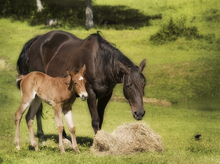In Britain, one horse rescue facility takes in about 200 neglected horses every year which keeps their facility constantly seeking feed, veterinary care, and staff to work with the unwanted horses. The same holds true throughout the world with many neglected and abandoned horses in the United States, Europe, Canada, and south America.

A lucky foal?
In the UK, a Need to Breed? initiative is now spreading the word about the impact that breeding just one foal can have on the horse population.
While the choices of responsible horse owners can seem far removed from the cases of neglect that make newspaper and TV headlines, rescue workers deal with hundreds of neglected horses throughout the world on a daily basis.
In the UK, a Need to Breed? initiative is now spreading the word about the impact that breeding just one foal can have on the horse population. With thousands of people all doing the same, this adds up to a huge number of extra horses every year.
According to the World Horse Welfare organization, all horse owners should take steps to reduce breeding of more horses.
"it is important not to underestimate the contribution of individuals – those people who perhaps breed because they have a much-loved mare, because they want the experience of producing a youngster, or to give an out-of-work mare a role.""
While having a foal may be very appealing, do any of these reasons really justify bringing yet another horse into an already crowded country, particularly when no one can genuinely guarantee a horse a secure home for life?"
The World Horse Welfare Organization notes that commonly repeated myths about breeding that are not true cause horse owners to think that they are right in breeding their horse, and many horse owners don't think through the responsibilities and complications that result from having another foal.
10 Myths about horse breeding
Myth 1: Breeding is always profitable. Fact: It has become increasingly difficult to make money from breeding, and there are certainly no guarantees.
Myth 2: It costs less to produce a foal for competition than to buy a competition horse. This isn't necessarily the case. Fact: Breeding a healthy foal and keeping it well cared for runs into thousands of dollars.
Myth 3: Breeding a good mare with a good stallion will always produce a good foal. Fact: Although good parentage is essential, there are still any number of problems the foal could have.
Myth 4: You can breed out any problems in the mare by choosing the stallion carefully and vice versa. Fact: This might reduce the chances of problems appearing in the foal, but isn't a guarantee and may actually be contributing to the wider continuation of these problems.
Myth 5: Pregnancy reduces the chances of laminitis. Fact: Although it was previously believed that pregnancy reduced a mare’s chances of getting laminitis, experts now believe that it can actually increase the risk.
Myth 6: Having a foal is easy for the mare. Fact: Although it is a natural process, this doesn’t mean it’s easy or stress-free. Even in a straight-forward pregnancy and birth the mare is still put through a lot of physical stress.
Myth 7: Breeding is a good thing to do with an out of work or retired mare. Fact: If the mare is retired, or out of work due to injury, consider whether it is right for her to carry the extra weight of a foal. Is the injury due to a problem that could be inherited?
Myth 8: Horses must have a ‘role’. Fact: Because keeping horses requires time and money, it is easy to think, or to be persuaded by others, that they need to do a job of some kind in order to ‘earn their keep’, such as being ridden or used for breeding. Many owners enjoy keeping their horse even if it doesn’t have a ‘job’ to do, and most horses are happy just to be horses as long as they are exercised.
Myth 9: I am guaranteed to find a good home for the foal. Fact: While there are some good homes out there, it is increasingly difficult to be certain where a horse will end up. There are currently more horses than there are good homes and sadly it is all too easy for horses of all types to end up with unscrupulous people.
Myth 10: I can guarantee the foal a home for life. Fact: You can have the best of intentions, but unfortunately, no matter how many plans you put in place, no one can give this sort of guarantee.
